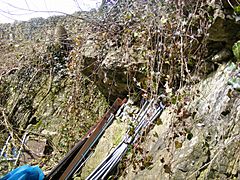Hobbs Quarry SSSI, Shepton Mallet facts for kids
| Site of Special Scientific Interest | |
 |
|
| Area of Search | Somerset |
|---|---|
| Coordinates | 51°11′58″N 2°32′33″W / 51.19936°N 2.54238°W |
| Interest | Geological |
| Area | 0.5 hectares (0.0050 km2; 0.0019 sq mi) |
| Notification | 1984 |
Hobbs Quarry is a special place in Somerset, England. It's a 0.5 hectare area near Shepton Mallet on the Mendip Hills. This site is officially known as a Site of Special Scientific Interest (SSSI). It was recognized as an SSSI in 1984 because of its amazing geology.
What Makes Hobbs Quarry Special?
Hobbs Quarry is a disused quarry, meaning it's no longer used for digging out rocks. Even though it's now part of a builders' yard, it's a very important spot for scientists. It's a "Geological Conservation Review Site." This means it's one of the best places in the country to study Earth's history through rocks.
A Look at Ancient Rocks
At Hobbs Quarry, you can see how different layers of rock tell a story about our planet's past. The rocks here show something called "early Jurassic transgression." This is a fancy way of saying that the sea level changed a lot during the early Jurassic period.
How the Rocks Are Layered
You'll notice two main types of rock at Hobbs Quarry:
- Carboniferous Limestone: These rocks are very old, from the Carboniferous period. They are steeply tilted, almost standing on end.
- Downside Stone: These rocks are younger, from the early Jurassic period. They lie flatter on top of the older Carboniferous Limestone.
This difference in how the rock layers are tilted shows how the Earth's crust moved and changed over millions of years. It's like a giant puzzle that helps geologists understand ancient environments and sea levels.
 | Percy Lavon Julian |
 | Katherine Johnson |
 | George Washington Carver |
 | Annie Easley |

